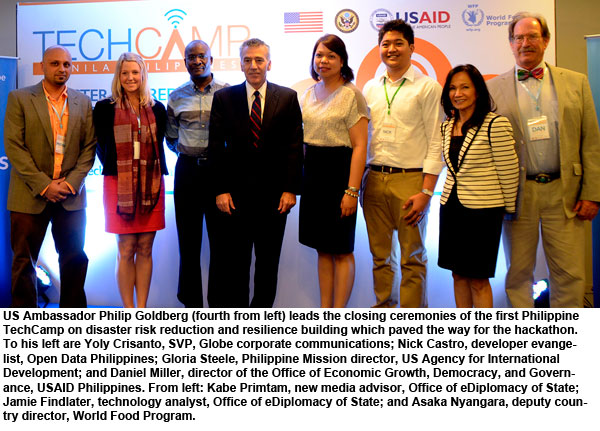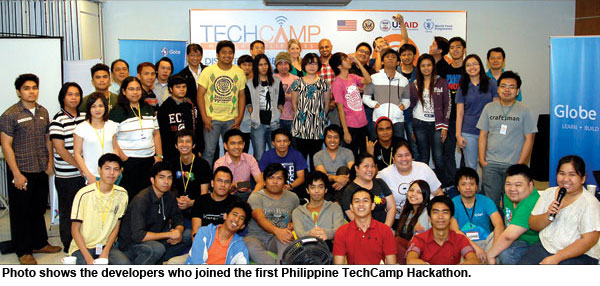Hackathon produces digital apps on disaster resilience
MANILA, Philippines - It was all for charity but participants in the first Philippine TechCamp Hackathon did not mind the stress and lack of sleep as they worked tirelessly for a night and a day to produce digital solutions to address challenges presented by the country’s vulnerability to disasters.
The event held at Globe Valero Makati was a collaborative effort by the US State Department, the US Agency for International Development (USAID), Globe Labs, Google Developers Group Philippines, and Open Data PH.
At the TechCamp Hackathon, 16 groups composed of up to four developers each competed against one another to come up with digital applications based on at least one of five problem sets identified during the first Philippine TechCamp Disaster Risk Reduction and Resilience building sessions last May 5-6.
“During the TechCamp, we were able to understand the pain points of the local government units and hear the various concerns of different cities when it comes to disasters. From there, we did the hackathon to address the main problem via the use of technology to prevent future disasters from causing severe damage to lives and property,†said Michelle Santos, developer relations manager of Globe Labs.
Three winners emerged from the hackathon, with “Kuwago†of software developer Kat Padilla and Web engineer Mark Steve Samson bagging first place. Kuwago was created to help local government units (LGUs) make smart decisions to solve problems of floods and landslides especially in vulnerable and poor areas based on real-time and available weather data.
“What we aimed to do is to provide a dashboard, something that LGUs can monitor, for them to make decisions in disaster situations. The dashboard will be able to render visualizations that are concise and easy to digest,†Samson said.
“There are three panels for every monitored value. For instance, there will be a time-series graph that is useful for answering questions like ‘Is it getting any worse?’ or ‘How much time do we have before we ask people to evacuate?’ A second panel shows the current value and the threshold value while the last one will show the evaluation and recommendation,†Samson added.
For the initial deployment of the application, the team of developers will be working with the LGUs of Rizal, Laguna, Tublay in Benguet, and Enrile and Amulung in Cagayan Valley.
In second place was “D.E.: Assessing Structural Integrity Made Easy,†a mobile app that accounts for the structural integrity of key and critical LGU infrastructure which are the first defense against disasters.
By answering a couple of questions in the app such as time, construction, crack, fire, water, and earth hazards, property surveyors can already do a preliminary report on building integrity which can significantly shorten the time spent in generating preliminary building inspection documents.
The report can be generated within five minutes instead of weeks. Data can also be saved offline to be sent to the server at a later time for further professional assessment.
The app was developed by software engineer Theodore Gonzalez and marketing officer Justin Cudaihl. Target LGU beneficiaries are Iloilo City and Cagayan de Oro City.
Rounding off the winners was “ERPAT,†short for Electronic Registry for Permit Assessment and Tracking, a digital app that will help LGUs cut the red tape in reviewing and issuing business, housing, and building permits.
This app will help ensure that LGUs would understand that they can prevent disasters by issuing permits only on areas that are considered safe and are in compliance with their respective land-use plans.
ERPAT is the brainchild of a four-man team composed of mobile and Web designer Joseph Emmanuel Dayo, product designer Mariwin Alvarez, and software engineers Mervin Joseph Alvarez and Anna Marseille Gabutero.
Instead of lining up to submit their applications and requirements, applicants can use this app for their transactions. The information will then go to the Android app of the building inspector who can immediately check the site and input data, pictures and notes in the same app for future reference. Potential LGU beneficiaries are Sorsogon City, Mabitac in Laguna, and Cagayan province.
The three teams received a grant of P30,000 each from the USAID to be used to further develop the apps for implementation in the LGUs.
The apps were chosen by a panel of four judges based on relevance, innovativeness, visuals, sustainability, completeness, and presentation.
The judges included Jay de Jesus, emerging media specialist for public affairs, US embassy; Ely Apao, user experience manager, OLX.ph; Pia Bernal, social enterprise investments manager, Kickstart Ventures Inc.; and Junito Berja, GIS specialist, World Food Program.
The best application also received P3,000 worth of API (application programming interface) credits from Globe Labs, entitling them to 6,000 outgoing SMS and 40,000 incoming SMS, or 600 minutes of calls. This is useful for voice or SMS-based applications which require the sending and receiving of alerts and subscriptions, among other activities. The credits may be used within a six-month period to help them with the development and testing.
These events were part of Tech for Resilience Week, geared toward harnessing technology to empower Filipino non-government organizations and LGUs to build climate-resilient communities. Tech for Resilience Week reflects a shared commitment to explore all solutions (especially technological solutions) to the risks and dangers posed by calamities.
- Latest

























